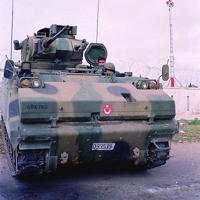Over the past few years, the Turkish defense industry has focused its research and development efforts on a range of new weapons systems, driven by the goal of an overall technological modernization of Turkey's armed forces. In the process, defense exports have doubled, demonstrating that Turkish defense firms also have the potential to impose themselves on the global market.
Turkish defense companies, backed by Turkish diplomats, have signed a number of high-profile export deals in 2011. Earlier this year, Turkish President Abdullah Gul's official visit to Indonesia -- which, with a majority Muslim population of 246 million, is likely to become one of Turkey's strategic allies in Southeast Asia -- brought contracts worth $400 million. Meanwhile, Malaysia, one of the world's largest arms importers, inked a $600 million deal to set up a Turkish-Malaysian partnership that will produce more than 200 armored vehicles. More recently, BMC, one of Turkey's leading producers of armored vehicles, announced it will soon start exporting one of its models to Iraq and Afghanistan. Moreover, several African countries have shown a growing interest in Turkish defense equipment: A Turkish delegation including representatives from the government and leading defense firms recently paid visits to Ghana, Nigeria and Kenya, and new deals seem to be in the offing.
Turkey's strategy has prioritized investment in the development of new products. One of the most interesting and keenly awaited projects is Turkish Aerospace Industry's (TAI) Anka, a medium-altitude long-endurance unmanned aerial vehicle (UAV). First presented at the International Defense Industry Fair in 2010, the Anka is currently undergoing flight tests, but several countries, including Pakistan and Egypt, have already expressed interest in purchasing it. Turkey itself has a strategic need for a reliable UAV fleet: Its purchase of Israeli-produced Herons has become a casualty of the ongoing diplomatic crisis with Israel, and the forthcoming withdrawal of U.S. Predators from northern Iraq will reduce its intelligence capabilities in the campaign against the Iraq-based PKK insurgency. As a result, TAI and the Turkish government agreed to speed up the engineering work, and now aim to have a fully employable version of Anka by mid-2012.

